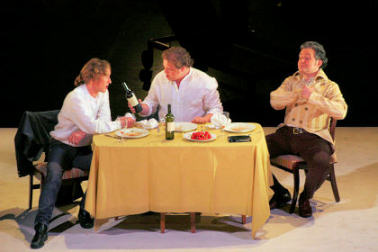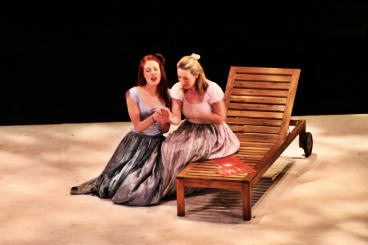|
Editorial Board
Melanie
Eskenazi
Webmaster: Len Mullenger
|
Seen and Heard Opera Review
This production of Così clearly took its inspiration from the lines spoken by Jaques in As You Like It in which he remarks that ‘All the world’s a stage, And all the men and women merely players…’ – appropriately enough, given the opera’s use of disguise and acting, but one might be forgiven for feeling that it was taken a bit too far here. It’s been done before, of course – as the black-clad stage hand sweeps the boards, the tenor skims along on his bike, the second soprano minces about in her high heels and the baritone adjusts his curly locks. Meanwhile the bass, ‘in control’ of it all, snaps his fingers and the ‘play’ begins. Effectively done, even if curmudgeons such as I do not particularly like stage business during an overture. The first scene was elegantly played, with the puppyish relationship between the young men firmly established, and the controlling hand of Alfonso manipulating it all. A similar stylishness governed the female household, with the balance between the sisters and their maid immediately obvious.
These roles are taken by six of the most prominent young singers around today, many of them established favourites of those of us who have long followed their careers at the RCM, so if at times they did not quite fulfil all that might have been expected, this was partly because expectations ran so high. Anna Leese has all a soprano needs to be a great Fiordiligi: ringing top notes, excellent breath control, exquisite soft notes and a wonderful stage presence, but on this occasion we were not hearing her at her best, possibly owing to a cold. ‘Per Pietà’ was sung very quietly, with some very fine legato on display but the more dramatic passages never took fire. She was, as always, excellent in ensemble and gave her all in the role, presenting a completely believable heroine. The Dorabella of Anna Grevelius was more successful vocally – ‘Smanie implacabili’ was more full of variety of tone than one has a right to expect from so young an artist – although she was rather subdued in her overall performance. I loved her singing in the ‘portrait’ duet, although it was sadly somewhat marred by silly stage business forced upon her and the Guglielmo.
That part was taken finely by Jacques
Imbrailo, definitely a baritone to watch: he took second
prize in the 2005 Richard Tauber Competition (the winner
being, unsurprisingly, Anna Leese) and has bookings all
over the place for the coming seasons. This is a very
light, beautifully coloured and flexible baritone, and
it belongs to a young man with a winning presence and
innate musicality – ‘Il core vi dono’
was as persuasively sung as I’ve ever heard. His
friend was solidly sung by Andrew Staples, although I
felt that he too was a little under par, with ‘Un
aura’ amoroso’ never quite reaching the heights.
Marc Labonnette’s Alfonso was a real smoothie, although
he was particularly affected by what seemed to be a lack
of sharpness in the direction of the recitative; ‘I
should have been an actor’ or ‘I ought to
have gone on the stage’ really should get some laughs
but it fell flat. The voice is promising, though, especially
in the middle register, and he is a confident actor.
That deeply irritating character Despina was played to perfection by Rebecca Bottone – her Italian is marvellous, of course (she is the daughter of the distinguished tenor Bonaventura Bottone) and she was, as Despinas often are, almost annoyingly comfortable with her role. I find her voice a little pallid in recital, but here it sounded more colourful.
The Classical Ensemble delivered a delicately phrased, loving account of the score under Ian Page’s direction, despite a few glitches with the clarinets and horns: these are, remarkably, the UK’s first fully staged performances outside Glyndebourne to use period instruments, and the playing did indeed reveal the freshness of the original sound. Page is a true singers’ conductor in that he allows them time to shape their lines and does not appear to impose too many restrictions on their vocal ideas: he is especially supportive in ensembles, and these were, as they should be, the highlights of the evening, with ‘Soave sia il vento’ and ‘Di scrivermi ogni giorno’ both so beautifully sung and movingly phrased as to give the most definite evidence that this work is not, as Wagner considered it to be, unworthy of the composer’s genius, but, as the director writes in his excellent notes, ‘one of the greatest works of art ever written.’
The Classical Opera Company is at the Barbican on Saturday 24th with a performance of Il Re Pastore, and I recommend this most highly: it is presented as part of the special 250th anniversary ‘Mostly Mozart’ festival, and features some of the company’s most promising young singers, chief amongst them the lovely Australian soprano Martene Grimson, a past winner of the Maggie Teyte prize. Although it’s an obscure work it contains some of Mozart’s most characteristic music, especially the finale and the famous aria ‘L’amerò, sarò costante.’ If you’re in London this weekend, the Barbican is the place to be on Saturday night.
Melanie Eskenazi
Back to the Top Back to the Index Page |
| ||
|
||||




